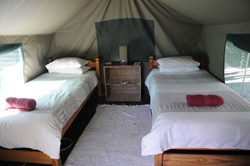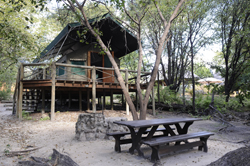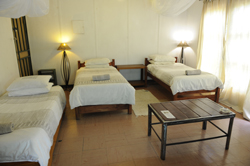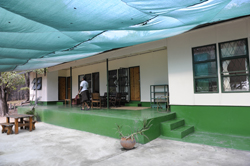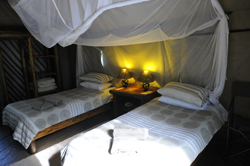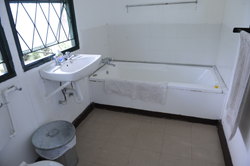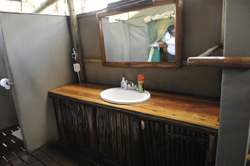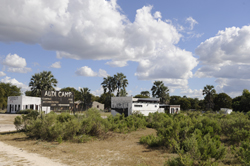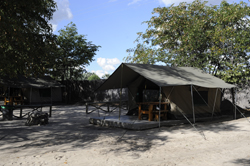| Audi Camp is situated at the edge of the
Okavango Delta 12Km from Maun.
The Camp offers camping, tented accommodation and en suite tents.
We have an a la carte restaurant, bar and pool. We also cater for a wide
variety of activities in and around the Okavango Delta including cultural
and community based trips.
email: maun@go.botswanatravelservice.com
Audi Camp is 12 kilometres north of Maun, on the road toward the Moremi
Game Reserve, located on the banks of the Thamalakane river – the
southern most tributary of the Okavango Delta.
Accommodation at Audi Camp Maun
We have luxury en-suite tents on raised wooden decking over looking the
river, mini-meru tents with beds, lights their own fire places and cooking
area. Large dome tents with stretcher beds.
We also have many shaded camping areas and some of the sites have power
points. We have a bar and a la carte restaurant.
Features of Audi Camp:
Camping and Accomodation:
We have 4 luxury en-suite tents on raised wooden decking overlooking the
river, a house with four rooms, 10 beds, kitchen, shower, bath and toilet,
10 mini-meru tents with two single beds, linen, electricity, fan and bedside
light.
We also offer 8 large dome tents with two camping beds and mattresses,
(bedding sets can be rented from the camp). The camp provides a large
shaded camping area for those of you with your own equipment, power points
sites available on request. The camp is fenced, has security lights and
a watchman patrolling at night.
Facilities Available:
Hot and cold ‘open air’ showers
Restaurant and bar area – breakfast, lunch, dinner and snacks available
all day
Conference facilities
Swimming pool
Self-catering kitchen and braai stands
Firewood/ice available to buy
Equipment hire for mokoro trips
Lock-away facilities for excess luggage.
Some ideas of what to do at Audi Camp:
Trips & Safaris
Vehicle Safari
Fly-in Trips
Mokoro Trips
Moremi Safaris
Kalahari Safaris
Chobe/Moremi Safaris
Luxury Mobile Safaris
Nxai Pans Safaris
Where is Audi Camp?
Audi Camp is situated on the banks of the Thamalakane River, 12km from
Maun on the Shorobe Road towards the Moremi Game Reserve.
PHILOSOPHY
Audi Camp was started in August 1993. Our goal was to provide quality
and value for money with camping and safaris in Botswana.
We have since expanded our operations and continue to adhere to the same
ideals.
One of the mainstays of our philosophy has been to work directly with
the local communities. Too often in the past, local people have only been
involved in tourism as employees and normally only as labourers.
They have never had the opportunities to develop their business skills
nor to have control or empowerment over of the local resources.
The evolution of these skills requires successes, failures and long term
experience. As the communities become more involved with the tourist industry
they began to see the value and uniqueness of their culture, skills, and
environment.
With experience and time we think that the communities will begin not
only to see their traditional knowledge and skills as a marketable service
but something worth passing on to future generations – rather than
being over run by industrial and western values.
Our mokoro trips should be viewed as a "cultural" experience
as opposed to a "wildlife" experience. In stating this, we do
not mean you will not see wildlife, wildlife is an integral part of the
local culture, but this should be secondary to experiencing the people
you will be with. What the traveller should understand is that different
cultures do not have similar "world view" perspectives. Trying
to see and relate to the area and environment as the local people do,
can be a fascinating experience.
We hope that you will take the time and the opportunity to try to do this
– but this will require an effort on your part. You will have to
do away with many of your own expectations and cultural bias.
This is a unique chance to involve yourself with a local culture. Although
they now are starting to earn a living from tourism, these people are
not "commercial" in any sense of the word. They are just very
nice, down to earth people trying to share their world with you. We hope
that you will join us, enjoy the people and enjoy yourselves.
THE OKAVANGO DELTA:
The Okavango Delta is one of the world’s largest inland water systems.
It's headwaters start in Angola’s western highlands, with numerous
tributaries joining to form the Cubango river, which then flows through
Namibia (called the Kavango) and finally enters Botswana, where it is
then called the Okavango. Millions of years ago the Okavango river use
to flow into a large inland lake called Lake Makgadikgadi (now Makgadikgadi
Pans).
Tectonic activity and faulting interrupted the flow of the river causing
it to backup and form what is now the Okavango Delta.
This has created a unique system of water ways that now supports a vast
array of animal and plant life that would have otherwise been a dry Kalahari
savannah.
The delta’s floods are fed from the Angolan rains, which start in
October and finish sometime in April. The floods only cross the border
between Botswana and Namibia in December and will only reach the bottom
end of the delta (Maun) sometime in July, taking almost nine months from
the source to the bottom. This slow meandering pace of the flood is due
to the lack of drop in elevation, which slopes a little more than 60 metres
over a distance of 450 kilometres. The delta’s water dead ends in
the Kalahari – via the Botetle river, with over 95 per cent of the
water eventually evaporating.
During the peak of the flooding the delta’s area can expand to over
16,000 square kilometres, shrinking to less than 9,000 square kilometres
in the low period. As the water travels through the delta, the wildlife
starts to move back into the region. The areas surrounding the delta are
beginning to dry out (the rains in Botswana occur approximately the same
time as in Angola) and the wildlife starts to congregate on the edge of
the newly flooded areas, May through October.
The delta environment has large numbers of animal populations that are
otherwise rare, such as crocodile, red lechwe, sitatunga, elephant, wild
dogs, buffalo, wattled crane as well as the other more common mammals
and bird life. The best time for game viewing in the delta is during the
May-October period, as the animal life is concentrated along the flooded
areas and the vegetation has dried out. The best time for birding and
vegetation is during the rainy season (Nov.- April) as the migrant bird
populations are returning and the plants are flowering and green.
Audi Camp Prices |
Prices are per |
Room Type |
High
Season |
Mid Season |
Low Season |
Price on request |
Price on request |
Price on request |
Price on request |
Price on request |
Price on request |
Price on request |
Price on request |
Price on request |
Price on request |
Price on request |
Price on request |
Price on request |
Price on request |
Price on request |
Price on request |
Price on request |
Price on request |
Price on request |
Price on request |
email: maun@go.botswanatravelservice.com
|
|
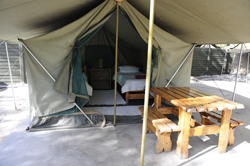
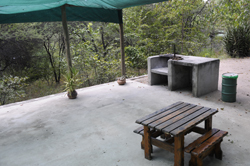
|
 Botswana Travel
Botswana Travel 


